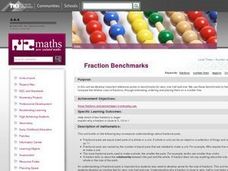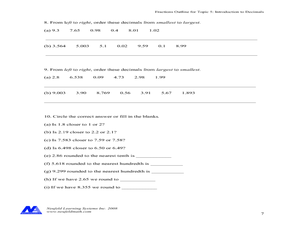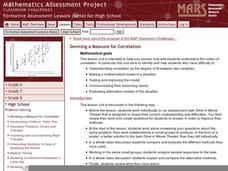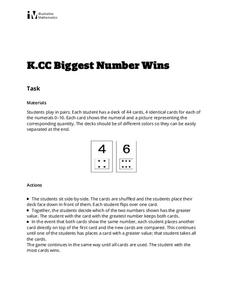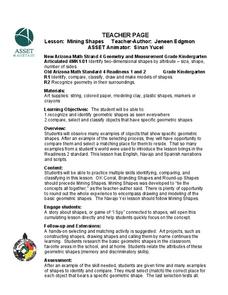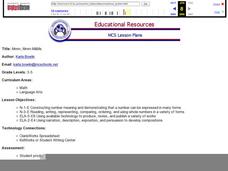Curated OER
Can You Name That Shape?
Learners use materials to build, investigate, and draw two-dimensional shapes (polygons). They combine the shapes they have built and draw from the pile to begin a round-robin activity to name and determine the attributes of a selection...
02 x 02 Worksheets
Inverse Variation
Discover an inverse variation pattern. A simple lesson plan design allows learners to explore a nonlinear pattern. Scholars analyze a distance, speed, and time relationship through tables and graphs. Eventually, they write an equation to...
Science Matters
Richter Scale
The 12th lesson in a series of 20 opens with a demonstration of exponential functions using pasta. This concept is connected to the Richter Scale, which is also an exponential function. Scholars compare the exponential scale that...
Curated OER
Indiana Applied Skills Assessment Sample
In this Applied Skills Assessment worksheet, 5th graders complete a sample state assessment for Language Arts and Mathematics for 5th graders. They read a writing prompt and complete a writing activity that follows, answer various types...
EngageNY
Applying Tangents
What does geometry have to do with depression? It's an angle of course! Learners apply the tangent ratio to problem solving questions by finding missing lengths. Problems include angles of elevation and angles of depression. Pupils make...
media.yurisnight.net
Science Lesson Plan: Our Solar System: I Wonder?
Ever wonder why Pluto isn't considered a planet? Or how large the Earth is compared to the other inner planets? Explore the universe with a series of projects that simulate different aspects of our solar system. The activities require...
Curated OER
Comparing and Ordering Quiz
In this interpreting information using a table worksheet, students read the U.S. Municipalities Census table to answer questions. Students answer 9 questions.
Curated OER
Fraction Benchmarks
Learners investigate the fraction benchmarks for zero, one half, and one. They use these benchmarks to compare the relative sizes of fractions, through estimating, ordering and placing them on a number line. An assessment worksheet is...
Curated OER
Introduction to Decimals
Young math whizzes complete the online instruction, then solve 20 problems about identifying decimals, comparing decimals and fractions and ordering decimals.
Curated OER
Teddy Bears and Friends
Children begin by making direct comparisons between objects and putting a number of objects into order according to length. They are also introduced to measuring with multi-link cubes which allows them to compare objects which cannot be...
Curated OER
Measuring Beads
Students compare the weight of the students's favorite soft toys directly and then indirectly using beads.
Curated OER
Does Sunlight Effect Leaf Size?
Students make estimates and then measure leaves for accuracy. They calculate the area of the leaves by drawing an outline on graph paper and counting the squares. They compare the leaves exposed to sunlight to those that are in constant...
Curated OER
Building Sets of 13 and 14
Compose and decompose sets of 13 and 14 and compare sets of each with your little learners. They use objects to construct sets of 13 and 14, record their answers, and compare sets in several different ways.
Curated OER
Devising a Measure for Correlation
How well does your class understand the concept of correlation? Use an activity to explore different methods of calculating correlation. Working alone and then in groups, your class will make decisions on what math to apply to the...
Curated OER
Worksheet Chapter 1 College Prep Algebra
In this algebra worksheet, students compare integers, translate words to a numerical expression, identify sets of numbers, identify properties, use order of operations, multiply fractions, and solve simple word problems. This 13 page...
Curated OER
Research Lesson
Once you have introduced the concept of comparing positive fractions, use this plan to further understanding. Pupils will start mixing positive and negative fractions through various learning activities. Note: Adapt this lesson plan to...
Illustrative Mathematics
Biggest Number Wins
Engage your mathematicians with this simple number-quantity game. Working in pairs, using two decks of 44 cards numbered 0-10 with corresponding sets of objects or images, young learners will each flip a card and decide which number is...
Curated OER
Number Sentences
Fifth graders become familiar with problem solving strategies of guess and check and working backwards. They demonstrate the basic concepts of addition, subtraction, multiplication, and division using a math sentence.
Arizona State University
Mining Shapes
Youngsters recognize and identify shapes. They draw, and use modeling clay to make shapes. They also identify shapes in their environment and in the Navajo culture, then compare the shapes and sort them into groups. This is the website...
Manchester University
Lesson 51: Scientific Notation
Discuss scientific notation with this mathematics lesson. Middle schoolers predict which problem is bigger of two numbers. They analyze the problems by observing the powers of 10 in order to decide which is bigger. This appears to be an...
Curated OER
Big Boats Up The River
Using boats along in the Port of Albany as the focus, learners practice adding single-digit numbers and interpreting data. This lesson comes with the worksheets, resource links, and other materials to make it a worthwhile experience.
Curated OER
Mmm, Mmm, M&M's
Here is another version of the classic M&M math instructional activity. In this one, upper graders utilize the ClarisWorks Spreadsheet program in order to document the data they come up with from their bags of M&M's. After making...
Curated OER
How Do You Get to School?
Third graders talk about all the various ways they get to school. They make a list of all the bus numbers that the students use. They also list all the other methods of transportation used and solidify a hypothesis.
Curated OER
Investigation - The Local Bagel Shop
Sixth graders investigate unit pricing to find which cup of coffee is a better buy. They use ratio and proportions to solve problems involving a change of scale in drawings, maps, recipes, etc. Students determine the unit cost of items...









